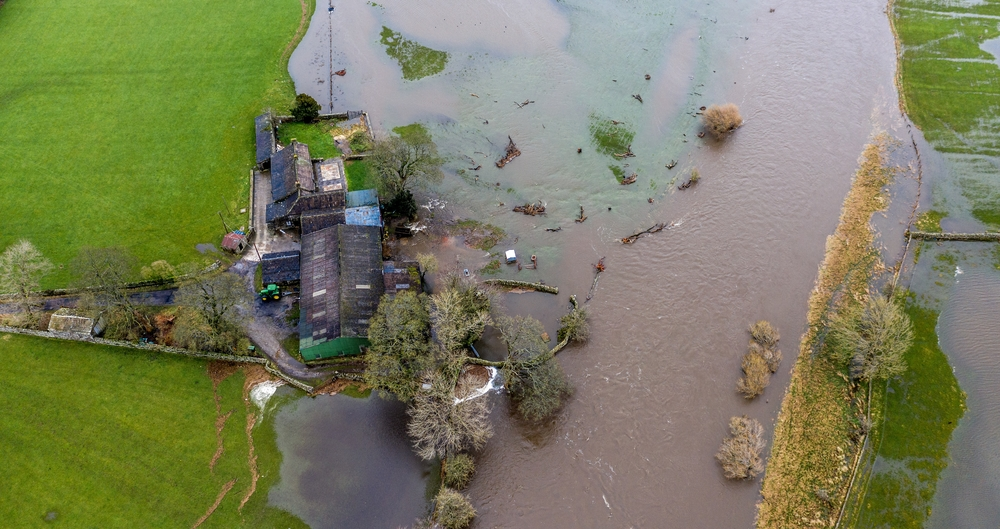The National Farmers’ Union has welcomed a range of measures brought in to help farmers in England recover from extreme floods over the last few months.
Intense NFU campaigning has resulted in the Government increasing its Farm Recovery Fund pot by £6 million. It takes the total fund available to help farmers affected by torrential rain in February to £10 million.
This third phase of the Farming Recovery Fund will cover farmers in new areas of East and North Yorkshire, Gloucestershire, Worcestershire, Shropshire, Staffordshire, Nottinghamshire and Herefordshire, with other areas such as Somerset and Cumbria being looked at.
Three-crop rule suspension
The Environment Secretary has also confirmed plans to suspend the ‘three-crop rule’ for 2020.
The three-crop rule was brought over from EU law when the UK left the EU on January 31, and requires farmers managing more than 30ha of arable land required to grow at least three different crops on that land.
Farmers with smaller land-holdings are also subject to crop diversification requirements.
With large swathes of farmland in England under floodwater for most of February, the Government is pursuing plans through Parliament to relax this rule for all farmers for 2020.
It means those who are unable to access their flooded land to plant spring crops will not be unfairly penalised.
The amendment will be made for Parliament’s approval as soon as possible.
Environment Secretary George Eustice said: “I have seen first-hand how devastating the recent floods have been to people and communities.
For farmers, the costs can be overwhelming, which is why we have extended the Farming Recovery Fund to help those affected by exceptional flooding get back on their feet.
“The three-crop rule is not practical in extreme weather events when farmers need to plan their spring cropping.
“Applying a blanket derogation for this year is the best way to reduce bureaucracy and leave farmers free to get on with farming.
“I’m also aware that the spread of the coronavirus (Covid-19) is causing other difficulties for the farming community.
“The Rural Payments Agency is working tirelessly to ensure farmers have access to all the guidance they need and we are exploring all options to ensure the right support is available in the coming weeks and months.”
Under the Farming Recovery Fund, affected farmers in eligible areas can claim for grants between £500 and £25,000 to cover a number of uninsurable repair costs, such as the re-cultivation of farmland, including re-seeding, replanting cover crops and alleviating soil compaction.
‘A huge relief’
NFU deputy president Stuart Roberts said: “This welcome increase in funding being made available, which the NFU has been calling for as a matter of urgency, will be a huge relief to those farmers affected by Storms Ciara and Dennis.
We know of some farmers facing bills of hundreds of thousands of pounds from uninsurable losses, including high-value horticulture crops rotting in the ground. And it’s been impossible to get new crops planted due to five months of incessant rainfall.
“With these types of extreme and volatile weather events becoming ever more frequent, the NFU will continue to work with the Government to ensure it takes all the steps necessary to protect productive farmland, so farmers can continue to produce a supply of safe, traceable and affordable food for the nation and protect and enhance our iconic British landscape.”
How to claim from the Farming Recovery Fund
The Farming Recovery Fund was opened to support farms affected by the June and July 2019 floods in North Yorkshire and Lincolnshire, and then was extended to cover the further flooding in parts of South Yorkshire, Gloucestershire and the Midlands in November 2019.
The announcement on Friday (March 20) brings the total funding that the government has made available for farmers to recover from exceptional flooding, during 2019 and the first two months of 2020, up to £10 million.
Under the Farming Recovery Fund, affected farmers in eligible areas can claim for grants between £500 and £25,000 to cover a number of uninsurable repair costs, such as the re-cultivation of farmland, including re-seeding, replanting cover crops and alleviating soil compaction.
More information on the application dates for the extended Farming Recovery Fund will be released in due course, which will include details on how to apply and guidance on eligibility within affected counties.
Farmers who have been affected are advised to keep records of evidence of flood damage, including receipts and before and after photos, in order to help the RPA process eligible applications promptly.
The Farming Recovery Fund handbook can be found here, on the UK Government website.

